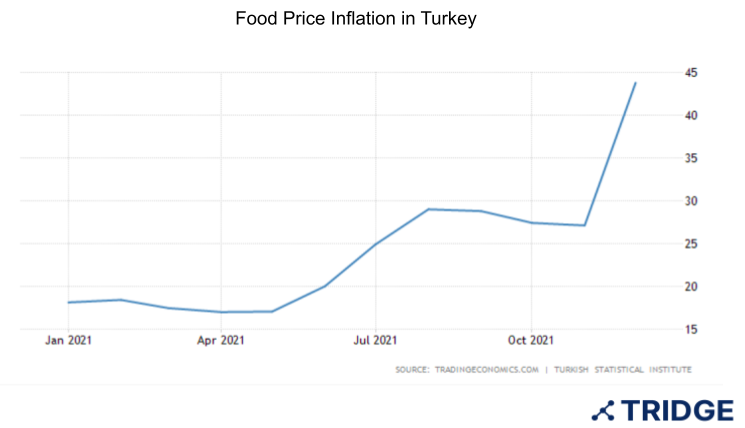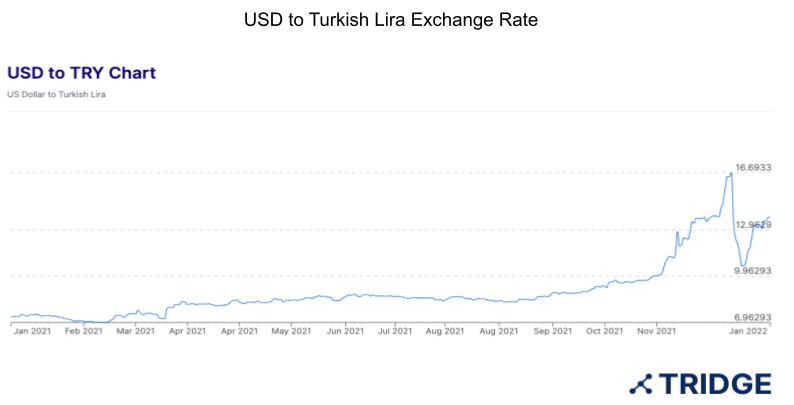Turkey Continues With Zero-Tariff Policy Imposed in September 2021 Amid Rising Food Price Inflation

Turkey has been reporting record inflation levels for the past few months which has also impacted the price of food across the country. As per the Turkish Statistical Institute, the country's yearly inflation rose to 36.08% in December and the yearly increase in food prices was recorded to be at 43.8%. In the last week of December 2021, the word “Ekmek 4,” meaning “Bread 4 Liras” was trending on Turkish Twitter as the consumers anticipated a potential rise in bread costs in the coming weeks. The average price of a bread loaf in Turkey ranges between USD 0.090 and USD 0.16 depending on the location of the bakery, but given the current inflation rates, these prices seem hardly sustainable. The price of one kg of flour has increased by roughly 90% in the past few weeks making the Ekmek 4 a far-fetched possibility for Turkish consumers.

Source: Trading Economics.
Although there are several reasons behind the rising food prices in Turkey, the low value of the Lira against USD and fall in cereal production had the largest impact on inflation levels. The Lira slid to record-low numbers in the last week of December 2021 when it fell by over 100% against the USD compared to 2020 values. It reached record lows against major currencies of the world which resulted in inflationary pressures on domestic prices as imports became more expensive. The higher prices were also triggered by a 14.3% year-on-year fall in cereal production during 2021. The wheat production fell by 13.9%, barley volumes declined 30.7% and the production of oats declined by 12.2% resulting in a shortage of cereals in Turkey and an increase in prices.

Source: xe.com
In an effort to increase the import of essential commodities and make them more affordable, on 8th September 2021, Turkey announced the elimination of tariffs on chickpeas, lentils, and cereals like wheat, rye, barley, oats, and sorghum seeds for sowing. The list was revised on 31st December 2021, announcing the decision that the import tariffs will continue to be eliminated on wheat, corn, rye, barley, oats, chickpeas, and lentils till 31st December 2022. The move is highly unusual but was much needed to control food inflation in the short-to-medium term. The removal of tariffs is expected to bring an inflow of essential agriculture commodities at relatively competitive prices. The affordable imports will help Turkey maintain a stock of these goods in the country and stabilize prices.
Food price inflation has become a burning issue in Turkey over the last few months and the situation is expected to remain the same in 2022. Apart from high food price inflation and devaluation of the Lira, Turkey continues to battle with extreme weather, soaring freight and fertilizer costs, shipping bottlenecks, and labor shortages. Furthermore, the country’s dwindling foreign currency reserves have made imports very costly, adding more pressure to the increasing domestic prices. It is expected that with the removal of import tariffs, the volume of imports of cereals will increase and the prices of these products will stabilize.
Sources
- AL Monitor. “Food price hikes feared in Turkey after currency slump”.
- NewsWeek. “Turkey Reports 36 Percent Inflation Rate, Food Prices Rise by 43 Percent Compared to 2020”.
- Successful Farming. "Turkey’s Cereals Production Falls 14.3% in 2021."
- USDA. Turkey Continues Zero Tariff Policy for Most Grains and Some Pulses.
- Xe. Currency Charts USD to TRY.





